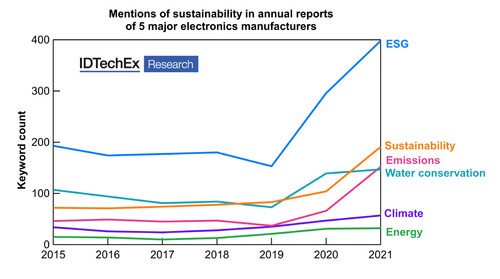Decarbonizing the Electronics Industry with Sustainable Manufacturing

A new wave of electronics manufacturing is on the horizon, driven forward by volatile energy prices and increasing demand for sustainability. With the electronics industry accounting for 4% of global greenhouse gas emissions, it requires substantial innovation to reduce its environmental footprint. Fortunately, this area has a lot of movement, with several potentially revolutionary technologies entering the scene. IDTechEx’s “Sustainable Electronics Manufacturing 2023-2033” report explores the key opportunities for sustainable innovation and the most promising new manufacturing approaches. The report concentrates on the fundamental building blocks of electronics – printed circuit boards (PCBs) and integrated circuits (ICs).

Incentives for Sustainable Electronics
Sustainability within the semiconductor and electronics industries is being driven forward by government mandates and green investment initiatives. Increasingly relevant to the survival of traditional manufacturers is the conscious choice of the public to only purchase from, and even only work for, companies that prioritize sustainable practices.
See related articles: Biden-Harris Administration Advances $750 Million Program to Strengthen Clean Energy Manufacturing and Recycling, American Battery Technology Company Selected for US DOE Grant for $115M First-of-Kind Commercial-Scale Lithium Manufacturing Facility, Braskem Releases its First Ever Lineup of Sustainable 3D Printing Filaments for Additive Manufacturing
Environmentalism is often perceived as an obstacle-laden with legislative red tape and burdensome disclosures. However, companies that embrace environmentalism reap long-term rewards, and as such, the negative perception is replaced by one of opportunity. The implementation of low-emission manufacturing processes or the adoption of material recycling and recovery schemes can be the financially astute choice presenting an opportunity to reduce costs associated with energy consumption, waste treatment, and superfluous steps. Prioritizing environmentalism keeps the industry ahead of the curve as legislation becomes stricter while positioning individual companies to benefit from designated ESG investment.
As energy prices rise globally, low temperature and rapid processing methods become more attractive. Some of these methods employ additive approaches that substantially cut waste by printing material only where needed. This spares manufacturers the costs and emissions associated with excess materials and etching required in traditional subtractive manufacturing. For example, switching to additive methods of PCB manufacturing can lower water consumption by up to 95% – an outcome that could save the sector hundreds of millions of liters of water annually.
IDTechEx’s analysis expects additive manufacturing to be particularly significant to the scaling of flexible printed circuit boards. Flexible PCBs are an important part of the emerging electronics industry as they enable a wider variety of applications than conventional rigid electronics. Flexible PCBs inherently require an overhaul of traditional processing – for example, using plastic or paper rather than conventional FR substrates. Embracing a new technology enables scope for further changes, such as transitioning to new materials and additive methods. Low-temperature processing may also be imperative for PCBs made on plastics such as polyethylene terephthalate (PET), considering that these have relatively low heat tolerances.
Digitization for Smart Manufacturing
Sustainable electronics manufacturing presents many opportunities to be more efficient, reduce waste, and improve cost-effectiveness. Sustainable manufacturing can be facilitated through artificial intelligence and Internet of Things. Using smart digital manufacturing methods to automate processes and sensor technology to detect leaks and improper material usage can help companies minimize waste and cut down on excess costs.
Digital data analysis can help remove superfluous steps and illustrate where to focus efforts to eliminate excess material and energy consumption. Digitization is becoming increasingly popular, with many household name brands adopting similar measures. At the end of 2021, Apple announced it had joined Sustainable Semiconductor Technologies and Systems (SSTS) – a program created by the Belgian research institute, imec, to reduce the environmental impact of semiconductor manufacturing. Imec’s SSTS program aims to improve sustainability by employing digital solutions that can assist in modeling less wasteful manufacturing methods. In addition to Apple, imec is also working with Microsoft and Amazon.
Outlook
Reducing the carbon footprint of the electronics industry is a daunting task, particularly for well-established manufacturers that are reluctant to divert from traditional methods. Across the world, government and consumer pressure are forcing manufacturers to take on greater responsibility in reducing their emissions. IDTechEx believes that by embracing sustainable manufacturing methods, companies can benefit financially and demonstrate significant reductions in environmental impact. A comprehensive analysis and exploration of sustainable innovations within the field can be found in IDTechEx’s report, “Sustainable Electronics Manufacturing 2023-2033“.
This report analyses the many innovations aiming to make electronics manufacturing more sustainable and how they are being deployed. It examines the current status and latest trends in technology performance, supply chain, and manufacturing. It also identifies the key challenges, competition, and innovation opportunities within sustainable electronics manufacturing. IDTechEx has 20 years of expertise covering emerging technologies, including printed and flexible electronics. Our analysts have closely followed the latest developments in relevant markets, interviewed key players across the supply chain, attended conferences, and delivered consulting projects on the field.
To find out more about the IDTechEx report “Sustainable Electronics Manufacturing 2023-2033“, including downloadable sample pages, please visit www.IDTechEx.com/SustainableElectronics.
Source: IDTechEx








